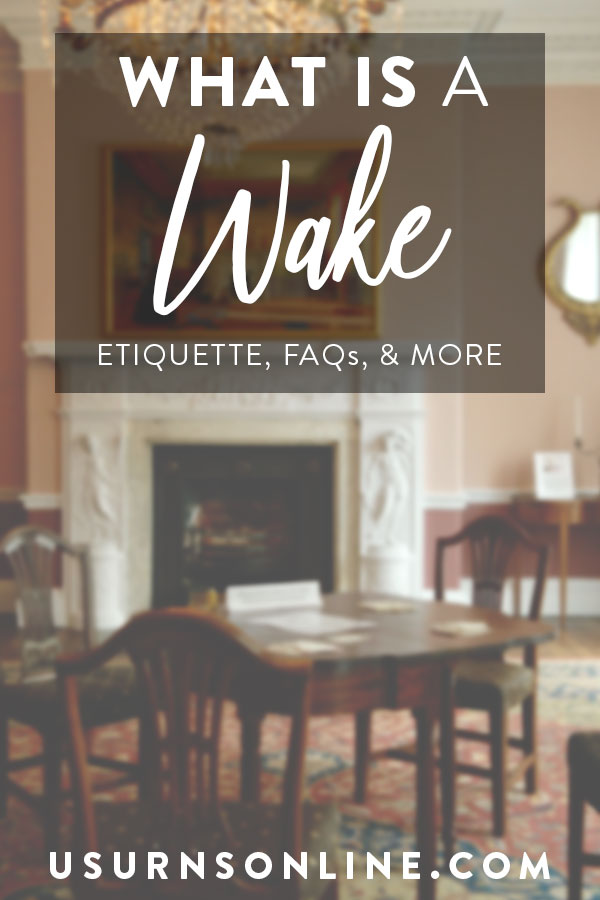Below you’ll learn everything you need to know about funeral wake meaning and etiquette. What is a wake? How are you expected to act, and what should you expect? What is the proper etiquette for attending a wake?
And the question most of you are probably wondering but are afraid to ask…
Will you need to view the body in an open casket?
There comes a time in almost everybody’s life when you are required or asked to attend the funeral wake for a loved one. But what exactly is a wake, and what happens during it?
Today we are going to answer these questions and more. So let’s dive right in!
What is a wake?
Often held in the decedent’s home, a wake is a time close friends and family members to gather together, mourn, visit, express condolences, and say their goodbyes to the departed loved one.
Generally speaking, a wake is the service held the evening before the funeral. Sometimes called a visitation or viewing, the wake is a solemn but usually informal gathering where those who knew the deceased person come to pay their final respects and show support to the family of the deceased. The body (or, sometimes, cremated remains) is typically present.
While the wake has traditionally been held in the home of the deceased (and many times still is), many funeral homes provide a venue for the wake and will often be the preferred location.
What is the difference between a wake and a funeral?
The key difference between a wake and a funeral is the formal structure of the event. A traditional funeral is a formal ceremony lead by an officiant that follows an order of service memorializing the deceased individual. The purpose of a wake to provide a time and place where family and friends of the deceased gather, and is therefore considered a social event.
Both the funeral and the wake serve as an important part of the grieving process for those who knew and loved the departed person.
Urns Made in the USA
What happens at a wake?
What you can expect to happen at a wake depends on the culture. If the deceased or their family was non-denominational or Protestant, the wake will likely be fairly casual. There may be singing or prayers or even a short sermon, but it will probably be more like an informal visit with the family than anything.
Ultimately, the wake is a time to pay your last respects and show support to the bereaved family.
The family will probably provide a guest book that you can sign (which you should do). There are often refreshments available (but don’t count on it!). If the deceased was Catholic, the Rosary may be said toward the end, and there may be a prayer vigil.
Other cultures and religions have various traditions for their wakes. For more information, please see Should I Attend Both the Wake and the Funeral?
Where is the wake typically held?
The wake can be held at the funeral home, a church hall, or at a private home, usually the deceased’s home or the home of a close relative.
When is the wake typically held?
The traditional wake is usually held the day before the formal funeral service, but occasionally it is scheduled for the evening of the funeral or the day after.
Because the body is generally present, the wake is traditionally held before the actual burial.
However, in modern times, the wake can refer to any informal social gathering or reception before or after the funeral, with or without the body present.
Will I need to view the body? Will it be open-casket?
You’ve been invited to a wake, but are not sure if you’ll be comfortable viewing the body. Is that okay?
It is 100% okay to not want to view the body, or even be in the general area with the casket. Remember that this is a very emotional time, and you are there to support the family (or they are there to support you).
You do not have to view the body if you are not ready to, and no one should make you feel like you have to. It’s a personal choice.
Typically there will be a room for the casket or cremation urn. Most wakes do have the body present, and most often it is open-casket.
But again, since the wake is a semi-informal event, you can attend and simply skip viewing the body. Just be prepared in the event that the casket is in the entry way or foyer.
Should I bring a gift to the wake?
You absolutely can bring a gift to the wake. But keep in mind that gifts are not usually expected. So if your question is, “Am I required or expected to bring a gift to the wake?” then the answer is, No.
However, if you want to show support in this way, consider plants or floral arrangements. These are an appropriate choice for a gift at wakes and funerals. You can order funeral flowers or plants at any local florist, and even have them delivered to the funeral home.
There may also be a wish on behalf of the deceased to donate to a charity in lieu of flowers. If that is the case, respect their wishes and donate instead of bringing a gift.
If you are looking for some more gift ideas, here are the best sympathy gift ideas for someone who is grieving. Ultimately, the choice of bringing a gift to the wake, memorial service, or funeral is up to you. But it is a lovely way to show your love and support.
Related: What should I send as a memorial gift instead of flowers?
What should I wear to a wake?
Wakes are usually less formal than the funeral service will be. While there is no dress code, it would be appropriate to wear “business casual” or “church clothes” to the wake, and save the formal attire for the funeral.
In some regions and cultures, boots, blue jeans, and a nice button-up dress shirt would also be acceptable. It really just depends on the culture of the family as well as the area’s societal norms.
If you are unsure, wearing black or other dark colors is the way to go. Here are some tips on what to wear to a funeral, which apply equally well to a wake.
Related: Can I wear jeans to a funeral, visitation, or wake?
Should I attend the wake if I don’t know the family well?
It is perfectly fine to go to the wake of a friend, or even an acquaintance or co-worker, even if you did not know their family.
It is appropriate to introduce yourself to the immediate family at some point during the visitation, if you are able to.
Likewise, the family will appreciate hearing any fond memories of the deceased you may wish to share. If this makes you uncomfortable, simply introduce yourself and tell the family that you are sorry for their loss.
What do I do if I can’t attend the wake?
If you cannot attend the wake, let the family know. Send the family a letter or card of condolence, letting them know you are sorry for their loss and that your thoughts or prayers are with them. The family will appreciate the gesture.
Attend the funeral if you can, but don’t beat yourself up if you are unable to go. Deaths, wakes and funerals often happen within the space of a single week. So most families understand that it is not always possible for you to attend.
Attending a wake is a very personal decision. If you are not sure if you should go, it helps to keep in mind that this service is really about supporting the family and also about saying goodbye. Remembering this will help you make the right decision.
Why is it called a wake?
The term wake originally referred to a late-night prayer vigil on behalf of the soul of the departed, where mourners would stay awake and pray to ward off evil spirits. This was particularly common in Irish culture in the Catholic tradition, which is why religious ceremonies and prayers are often included in the wake.
However, over time the wake custom has turned into a social gathering in remembrance of the departed, and will only include religious elements if the family chooses.
The wake is just one type of service celebrating the life of a loved one. Read all about 10 Different Types of Funeral Services.
What is a modern wake like?
The modern-day wake is a gathering of mourners where each person remembers and celebrates the decedent in their own way.
The body of the deceased will often be present in the casket, and you will have the opportunity to say a final farewell if you so choose. Otherwise, it is typically much like a funeral reception, but in a family home or sometimes in a reception area at the funeral home.
Wear semi-formal attire and expect to mingle, partake of appetizers and drinks, tell stories and share memories of the departed loved one, and express your sympathies to the bereaved families.
What is an Irish Wake?
The Irish are famous for their wakes. We’ll let the late comedian Dave Allen (1936-2005) explain it with a sketch from The Dave Allen Show:
A very important part of the Irish way of life is death.
If anybody else in the world dies, that’s the end of it; they’re dead. But in Ireland, when somebody dies, we lay ’em out and watch ’em for a couple days. It’s called a wake.
It’s a great – it’s a party, it’s a sendoff. And the fellow is laid out on the table, and there’s drinking and dancing and all the food you can eat. And all your friends come from all over the place, and they all stand around the wake table and look at you with a glass in their hands, and they say, “Here’s to your health!”
The terrible thing about dying over there is that you miss your own wake. It’s the best day of your life – you’ve paid for everything, and you can’t join in! Mind you, if you did, you’d be drinking on your own.
We hope you found this Q&A about wakes helpful! Let us know your question, thoughts, or additional insights in the comments below.
Read next: 30 Questions About Death, Dying, and Your Legacy





